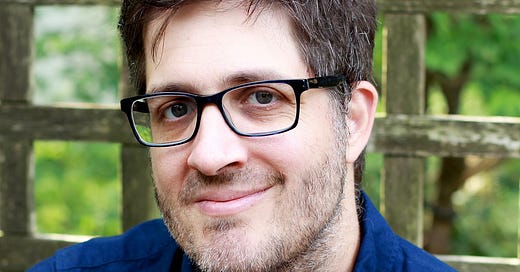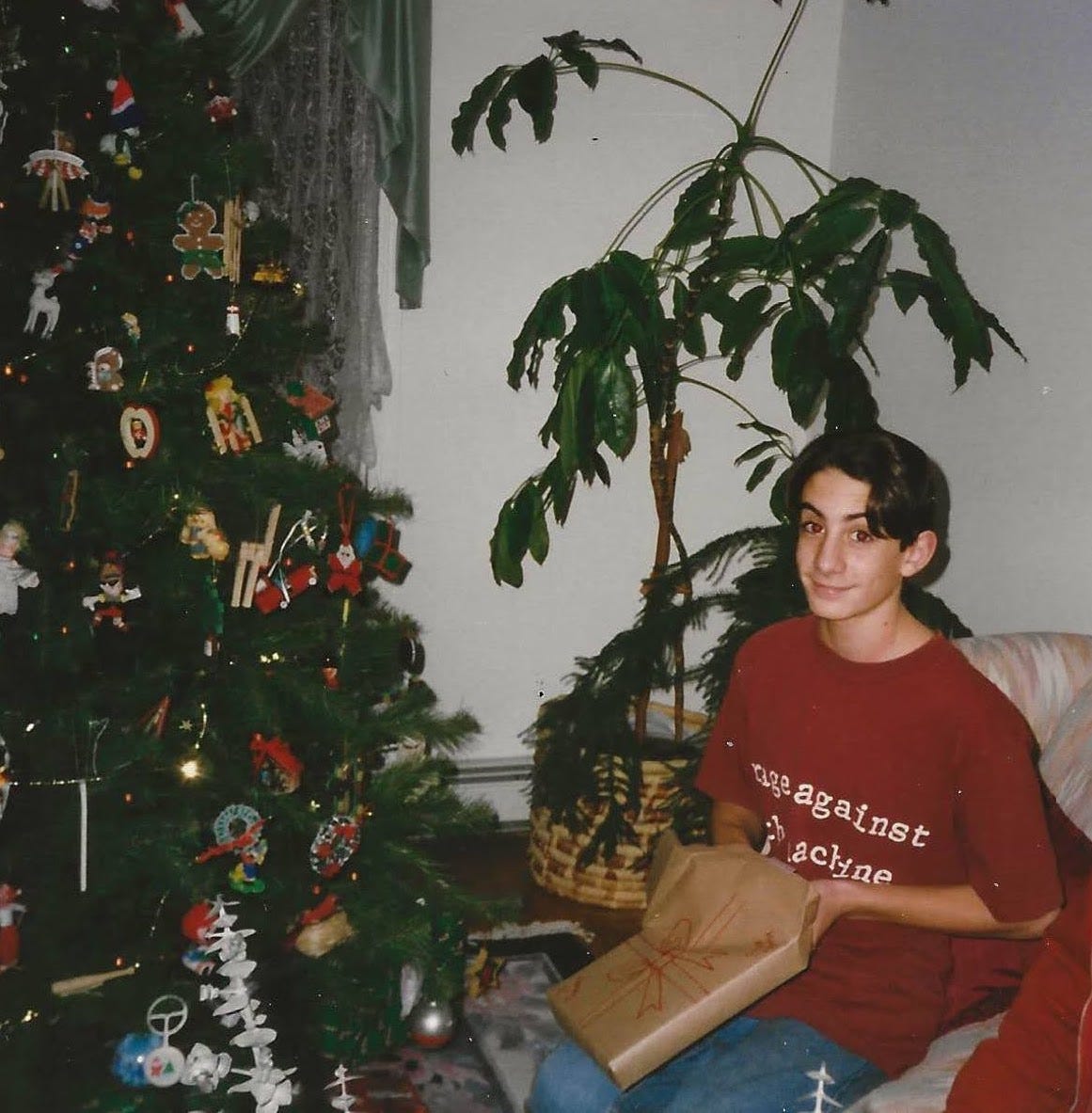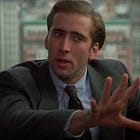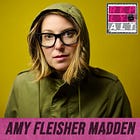Misremembering the 90s with Rob Harvilla
Talking to the author and host of '60 Songs That Explain the '90s' about cramming an entire decade into one book.
Hello and welcome to the greatest ever music newsletter. Every week I publish a column about rock books. Author interviews, book recommendations, signed copy giveaways, etc. Today’s edition is free but paid subscribers get access to it all. Sign up if you haven’t already.
A quick note before we get started today: If you’re planning on ordering anything from my store, make sure to do so before December 18. That will be the last day I make a trip to the post office. Any orders received after 12/18 will not ship until the new year! Also, I will keep the discount code active through then. 20% when you use the code SEASONALSELLOUT. Still got some signed books, zines, vinyl, etc. in there. Last call.
60 Songs That Explain the ‘90s
On the day I was scheduled to interview the great Rob Harvilla about his new book, 60 Songs That Explain the ‘90s, I woke up early to head to the gym (I was trying to look impressive to Rob). Two young employees were sitting at the front desk and I overheard a short snippet of their conversation in passing:
Female employee: “So wait, what were the 90s then?”
Male employee: “The 90s were like… grunge.”
Female employee: “Like, Metallica?”
Male employee: “No, that was the 80s.”
Clearly, as our foremost documentarian of 90s culture, Rob has his work cut out for him. 60 Songs That Explain the ‘90s, borne out of the beloved Ringer podcast of the same name, was released this month and I was lucky enough to write a blurb for the cover. The best way I can describe the experience of reading 60 Songs is to liken it to channel surfing. Rob jumps around rapidly from artist to artist, song to song—personal anecdote to brilliant retelling of a pop culture moment to dead-on critical analysis of a pop song. I can almost hear the little static clicks of a remote control between paragraphs. It is the perfect style of prose for a generation whose attention spans were melted like Gushers in the hot sun by years of Beavis and Butt-Head episodes, MTV music videos, and after school specials about why it’s bad to take caffeine pills.
I talked to Rob about taming this anarchistic writing style and fitting it into a book, how people today get 90s nostalgia wrong, and what the future of podcasts will hold. (And if this is not enough Ozzi/Harvilla nostalgia tripping, I also once appeared on his podcast to discuss the brilliance of, what else, blink-182.)
Usually when I read a music book, I'm able to deconstruct it and figure out the author's process. But I genuinely have no idea how you put a book like this together. It feels like freeform jazz, in a way. I’m very curious about what your process was like, covering all that you cover.
Rob Harvilla: [Laughs] Yeah, the Ornette Coleman of 90s nostalgia, that's how I've always thought of myself, so this is really gratifying. The podcast is scripted, down to the word. So at the point that I'm writing the book, I have maybe 75 episodes in the can, so I have like 600,000 words of raw material. I just have an absurd amount of data to sift through, and my initial plan was just publish the transcripts and cash the check, which was not logistically possible. So it's me with a Google Doc of the 75 songs that I've covered, the 25 to 50 other songs that I want to include in the book, and I'm trying to figure out how to organize them. I'm trying to put them in chapters that have some sort of coherent theme, but also embrace the chaos of it. Just finding ways to bounce these songs off each other and get from Celine Dion to Hole in two sentences.
As for the writing, it does start from a place of taking the parts that I really liked from each episode out of each script and trying to string them together, trying to get them in conversation with each other and add a bunch of new songs, a bunch of new artists, a bunch of new ideas. So it's this weird combination. I was able to do it a lot faster than if I just wrote 80,000 words from scratch. It was sort of a remixing of existing material with the new material and just trying to get these songs in different and, hopefully, interesting combinations. Every chapter starts with a list of the 12 songs that I'm gonna cover. My goal is: you read that list of 12 songs and think, “These songs don’t have anything in common.” But by the end you're like, “OK fine.”
Right, I went into every chapter thinking, “No way he’ll connect these songs,” and by the end I’m like, “He fucking did it again!”
Exactly. Ornette Coleman strikes again.
The balance you have between personal stories and opinion and history and facts, what books or writers inspired the style of this book?
That's interesting. I mean, Chuck Klosterman is pretty hard to get away from. From Fargo Rock City forward, I think he set, in this brilliant way, a template for that kind of thing, where you could talk about the music you love and show that you had a certain amount of scholarship for it and a critical aptitude for being able to talk about it and put it in context. But also, understanding that your rock critic opinions don't necessarily carry as much weight as your teenage dipshit opinions. There's thousands of different ways to hear a band, a song, whatever. So when I started the show, I'd never really intended to talk a lot about myself. And I still try to find the balance, where I'm not talking about myself so much that it's gratuitous or I'm not trying to posit myself as an inherently interesting person, necessarily. But I do think that the feedback that I've gotten from the show, and from the book so far, is that people listen to my hilariously mundane suburban anecdotes about the time we drove to Eaton Park while listening to “Crash Into Me,” and the reader, the listener, they're thinking now about their own mundane suburban experiences—who was in the car, what song was playing, where they were going. And the idea is, the more specific the song, the more universal the sentiment.
Having written music books that are strictly historical, if I write that an album was well received, I need to find five reviews to back it up. But reading your book sometimes reminds me of that meme that's like, “Source: trust me, bro.” Like, you’ll say, “Everybody in my high school loved Dave Matthews Band.” And I’m like, “Well, who am I to argue with that?”
Yeah, Ornette Coleman is right on this one. [Laughs] I just reached out to everyone on Facebook to confirm that, and they did, in fact. Rigorously fact-checked, yes.
You do cite a lot of books in your research, but you also employ a good deal of 90s folklore or information that was passed around but maybe not documented. So I'm wondering: how does a book like this get edited? How does it go through a fact check?
[Laughs] How did it, actually? The idea was: one third is a critical historical view with verifiable facts, etc. One third, like Song Exploder, is sort of analysis of individual parts of the song. And one third, like Pop-Up Video, is just amusing anecdotes or whatever. And again, the personal part, like my teenage misadventures, that sort of crept in naturally and that stuff isn't fact checkable or verifiable, necessarily. And so I just try to be honest, both in the show and certainly in the book. I try to interrogate the wistful teenage reveries when they pop up. When I give a concrete memory that I have, every part of this memory is probably wrong, right? But what matters now to me is the way that I remember it, even if it isn't true. I just try to be clear from moment to moment when I am stating a fact versus when I am stating my explicitly rose-colored view of my own past. I think that everybody does that to an extent.
Has documenting a decade retroactively made you any more of a documentarian of the present? I feel like, personally, I'm taking more photos now, I'm holding on to more ephemera.
I don't think that I have, honestly. And part of that is that this was a COVID era project when it started. We talked about it in the summer of 2020 and the show launched in October, right around when my daughter was born. My daughter was born on Halloween, 2020. So we were in extra lockdown. There was precious little to document in my day-to-day life, where we were all just locked down and doing homeschooling and whatever. We've certainly opened up quite a bit since then, but I am, at heart, a mid-40s suburbanite who is feeling really great about myself for getting out to a show every couple months. I think for me, the challenge is living in the 90s in my head professionally for three and a half years. It’s harder and harder to keep up with new music. For someone my age and in my position, most of the new music now isn’t being made for me.
You and I are old enough now that we've lived to see 90s and early 2000s trends in fashion and music come back around among younger people. I wanted to get your opinion on that, because to me it always seems a bit off. More studied than sincere, like a 90s costume party, you know?
It’s a weird feeling seeing Nirvana shirts for sale in Target. I’m very interested in the 90s as an aesthetic and a brand, versus what we actually lived through. They just announced that cruise where the lineup is essentially every band from the 90s that is still around. Everclear and Fastball. Hootie and the Blowfish does stuff like this. The Gin Blossoms are always touring as part of some 90s package. That's just sort of the way history works, I guess, the farther we get from it. But I agree completely that it comes back around in sort of an oversimplified and fake-sounding way, but at the same time, I don't remember it the way it really was, you know? And I’ve been trying to document it for the past three years. Nobody gets that right, the mistranslation of the 90s, as we talk about them today versus what they were really like. That dissonance is a big part of the fascination for me.
Have you gotten to the nostalgic age yet where you're trying to buy back band t-shirts that you owned in the 90s? Has the vintage trend hit you yet?
That has not hit me yet. My good friend Alan Siegel, who writes for The Ringer, does that.
I ran into him at the flea market the other week, which is where you go to buy such things.
Absolutely. Because he's got them all. Every time I've seen him, he’s wearing, like, a vintage Smashing Pumpkins shirt. I really want to get into that.
You don't.
Yeah, it's expensive, right?
On Sunday, I saw this Rage Against the Machine t-shirt that I owned when I was 12. My favorite shirt, that red one with the molotov cocktail on the back. Then you look at the price tag, and you're like, “Ah, well, my youth is not worth this much.”
How much?
I could be wrong but I think it was like 130 or something.
I was going to guess like 300. Some of those things are nuts. The Pearl Jam stickman shirt was very important to me at the time. And I'm sure I could buy a knockoff, but on Depop or whatever, if you're talking, like, an actual, 1990s Pearl Jam shirt… yeah, I don't have the cash for that. I don't think my wife would sanction that buffoonery. So it's not going to happen.
It's a really good question. It's a really scary question, because I started at alt weeklies. One in Columbus, one in Oakland, and then the Village Voice in New York City. And the whole time I'm there, every Thursday an issue would come out and I’d throw it on a stack. But I didn’t take those with me when I left, because I thought, “It’ll always be online.” Even the Village Voice, what percentage of the stuff I wrote for the Village Voice over the course of five years—and this was 2006 to 2011, so not ancient history—but so much of it is gone. So much of what I've written already is functionally gone. So my impulse now is to say, “Oh this is totally different. Of course Spotify will always be around.” But that's incredibly naive. So the answer to your question is that I had better fucking download these things. It's very silly of me to ever assume anything about the longevity of anything. That's a very grim thing to say but I think that's been borne out already. I worked for SPIN for a short time, I worked for Deadspin, pre-Hulk Hogan, and I don't even know if that shit's around anymore. It's very dismaying to think about how sure I was at each of these publications about how solid they all seemed, how solid their archives seemed. That's just absolutely not the case. And that's a really scary thing.
Well, books are forever. Maybe this podcast now being represented in book form will do something to preserve the cultural relevance of it.
That's the hope, anyway!
This interview has been edited for length and clarity.
More author interviews:
Follow me on the internet. Instagram | Threads | Bluesky | Twitter | Website
Get my book SELLOUT at Bookshop, Barnes & Noble, or Amazon.









